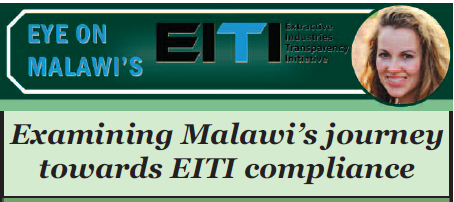The piece “Eye on Malawi’s EITI: Malawi’s Multi-Stakeholder Group Meets for the First Time” featured below was initially published in Malawi’s Mining Review Issue Number 24 2015 that is circulating this April 2015.
The full edition is available for download here.
To learn more about this quarterly publication, edited by Marcel Chimwala, read the post about the “Voice of the mineral sector in Malawi”.
Malawi’s Multi-Stakeholder Group Meets for the First Time By Rachel Etter
On 18 March 2015, Malawi’s Extractive Industries Transparency Initiative (EITI) Multi-Stakeholder Group met for the first time. This is a “very important milestone” as the Assistant Director of the Revenue Policy Division in the Ministry of Finance and Economic Planning and Development, George Harawa, announced while chairing the first meeting. The Government’s commitment to EITI reflects the move to more informed public debate on the way the nation’s resources and associated revenues are used.
Representatives from government, the mining industry and civil society, selected over the last few months by each constituency, sat around a table to discuss the EITI implementation. The Ministry of Finance, Economic Planning and Development, the Ministry of Natural Resources, Energy and Mining, the Reserve Bank of Malawi, the National Audit Office, Bwanje Cement, Globe Metals & Mining, Paladin, ActionAid Malawi, the Catholic Commission for Justice and Peace, Citizens for Justice, and the Foundation for Community Support Services were all present. Only Mkango Resources sent their apologies.
Through this initiative, the government will publish what is receives in taxes and other payments from the industry and companies will publish what they pay government. This should stimulate discussion on how commodity wealth is being translated into socio-economic development for the country. The annual report will also include contextual information, a description of the legal framework and fiscal regime that govern the extractive industries, an overview of exploration activities, production data and register of licences.
It is yet to be seen if Malawi will also apply the EITI Standard’s voluntary provisions on beneficial ownership and contract transparency. A register of beneficial ownership will reveal more about who owns extractive companies and who will ultimately benefit from the company’s activities. According to EITI, the identity of “real” or beneficial owners is “often hidden behind a chain of corporate entities. This opacity can contribute to corruption, money laundering and tax evasion in the extractive sector”.
Disclosure of contracts and licences that provide terms is also recommended by EITI. Publically accessible contracts can provide stability for companies and ensure that a country’s “wealth is maximised and invested into projects that yield development”, remarked Tanzania Member of Parliament Hon. Zitto Kabwe during EITI consultations on contract transparency.
Malawi plans to submit its application to the EITI during the next quarter. The Multi-Stakeholder Group will guide this process and is responsible for developing a fully costed work plan and its own terms of reference which are prerequisites for signing-up. The financial resources and time invested must reflect the current size of Malawi’s mining sector, which the Government hopes will grow to become a significant contributor to the country’s economy.


Pingback: Link Roundup for Extractive Industries in Malawi: April 2015 | Mining in Malawi·